All ministers are diplomats now:
Bringing the whole of government to international relations for prosperity, security and national positioning
By Jolyon Welsh
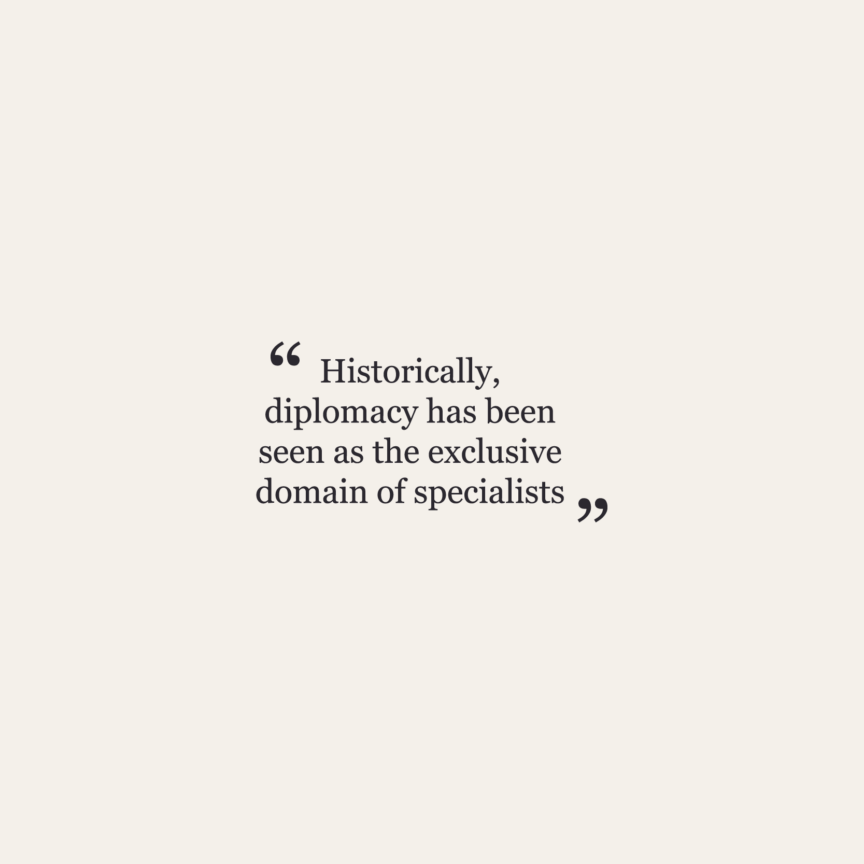
Today all branches of government have international interests
In 2020, the COVID-19 pandemic caused widespread suffering across the world, and left governments operating in a context of high uncertainty. Besides the severe health and social challenges, the pandemic triggered the most serious economic crisis since World War II. [1] The World Health Assembly (WHA), made up of 194 member states, convened in May 2020 to discuss the pandemic. Member states emphasised the need for solidarity, resource distribution and collective action. The World Health Organisation (WHO) launched the Access to COVID-19 Tools (ACT) Accelerator, a global collaboration to develop diagnostic tests, treatments and vaccines, as well as the COVID-19 Solidarity Response Fund.
In the midst of the pandemic, an unexpected group of individuals found themselves thrust into the spotlight of global diplomacy: health ministers. Traditionally tasked with ensuring the well-being of citizens within their nations’ borders, now they were tasked with tackling complex and globally distributed challenges that extended far beyond their conventional domestic realm. Health ministers had become unlikely diplomats.
The scale of the pandemic was massive, but its complex and distributed nature was not new. Many of today’s global challenges are similarly complex, distributed and highly interconnected, and often involve conflicting values and positions. The collaboration through which the world (with some notable exceptions) tackled the global pandemic was an example of modern diplomacy. This modern diplomacy is essential for addressing other global challenges – which include climate change, energy security, poverty and terrorism – and it plays a crucial role in promoting peace, stability and cooperation among nations.
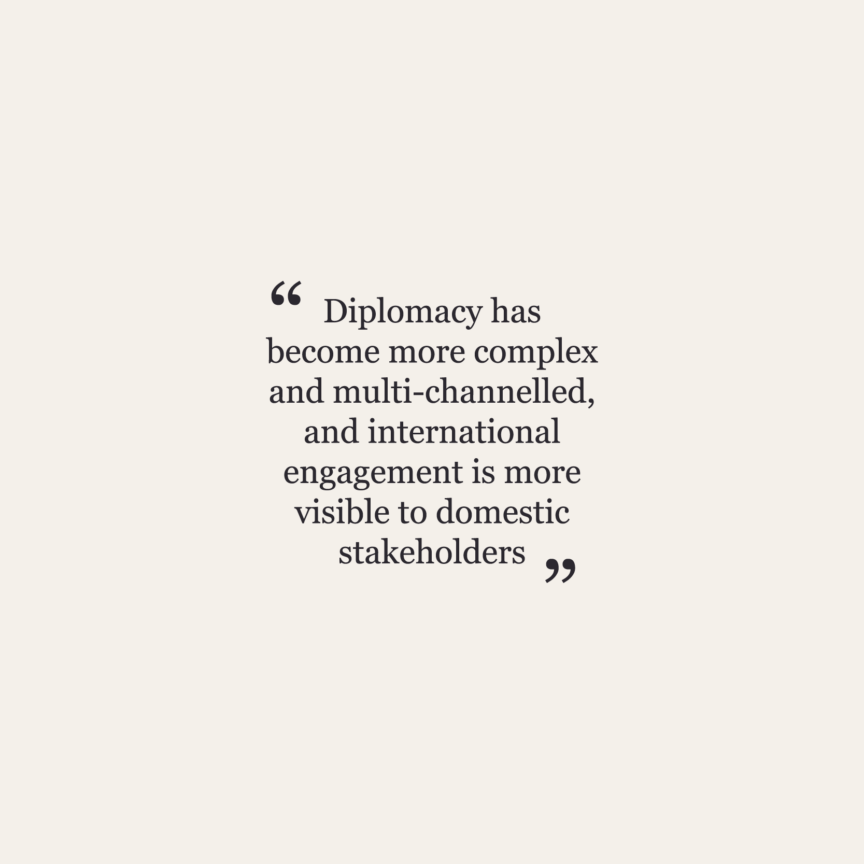
Historically, diplomacy has been seen as the exclusive domain of specialists: career diplomats in foreign ministries and embassies; intelligence services; the military; and sometimes cultural services. In ancient times, diplomacy was conducted by aristocrats or other members of the ruling elite who had training in philosophy, rhetoric and negotiations. More recently, rigorous selection, diplomatic academies and years of experience have produced specialised diplomats who are suitably prepared and trained.
However, the complex and interconnected nature of today’s problems – against the backdrop of globalisation and the ease of direct communication – means that nowadays almost all branches of government have international interests. Ministries with responsibility for health, environment, energy, sport and illegal drugs, to give just a few examples, are increasingly engaging the international system and international partners directly. This is necessary, and entirely right – but it does come with two specific challenges.
First, individual government departments often lack the specialist skills and knowledge to engage effectively and achieve what they want. Second, different parts of government can find themselves pursuing competing international objectives, particularly where cross-government coordination is weak.
Rapidly changing mass communication and an increasingly atomised media landscape further complicate matters. The result: diplomacy has become more complex and multi-channelled, and international engagement is more visible to domestic stakeholders. David Kelly, a former British ambassador to Moscow, dismissed in 1952 as a “pathetic fallacy” the notion that diplomats should try to make contact with “the man in the street”.[2] With today’s technology and social media, contact with the “man in the street” is often an essential element of effective diplomatic campaigns.
Diplomacy is a high-stakes game. Getting it wrong can be catastrophic – diplomatic missteps can cause harm to individuals, economies and entire regions. Given all the new challenges of diplomacy in today’s world, how can government leaders most effectively ensure security, prosperity and positioning for their country and their citizens?
We believe there are four focus areas where government leaders can strengthen diplomacy.
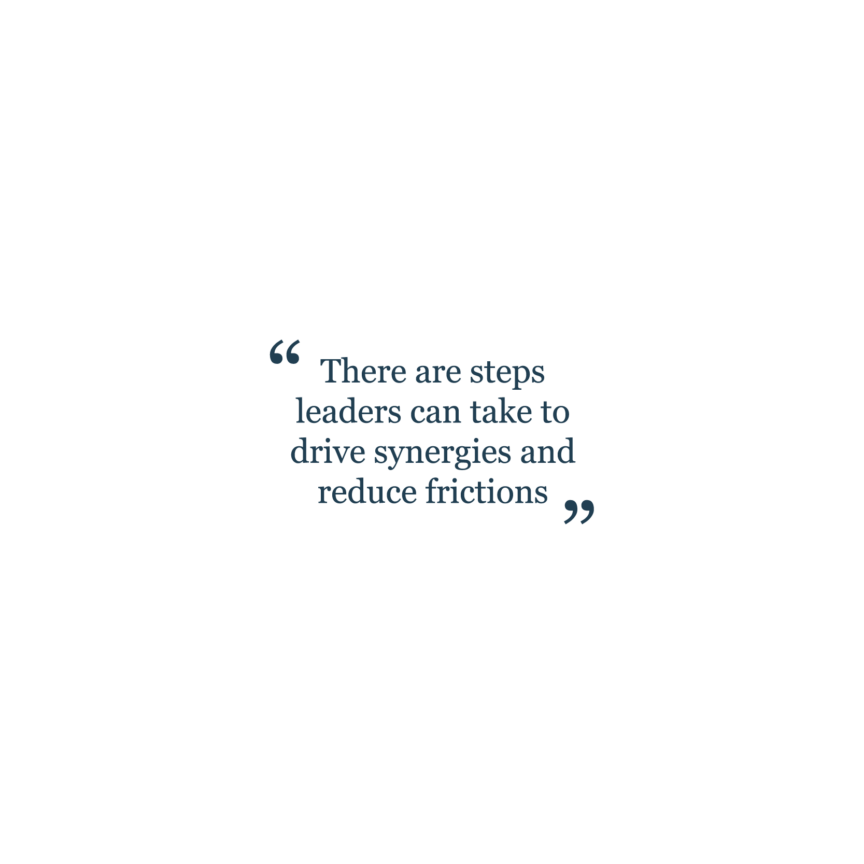
1. Drive better coordination across governments’ international relations
Coordinating departments’ international engagement across government is complex and difficult. But although there are no perfect models, there are steps leaders can take to drive synergies and reduce frictions. In particular, Head of Government Foreign Policy Units (FPU) are essential for establishing the leader’s top foreign policy priorities, disseminating these through the rest of government and holding other ministries to account for delivery – as well as supporting the leader’s own international engagement. Priorities might range across country relationships, institutions or themes. By way of illustration, in this model, a leader of a major EU state might identify the US relationship, EU reform and international security as his or her top priorities. The FPU would translate those broad priorities into specific objectives, make sure the Ministry of Foreign Affairs, embassies, and other parts of government were giving them sufficient focus, and build a personal international engagement programme for the leader which delivered against them.
A model which some countries have tried is to establish their ambassadors as the owners of their bilateral relationships. In this model, a country’s ambassadors have oversight of all aspects of their country’s relationships with their host countries. They are thus involved in all policymaking relating to their countries, regardless of which domestic ministry owns it. Modern communications technology makes this easier. But it does mean that the ambassador needs to be supported by a proper staff, based in the foreign ministry or the embassy. And it requires discipline across government ministries.
Another approach would be a return to foreign ministries managing the full breadth of a country’s international relations. Most foreign ministries are now under-resourced to do this, and it would add a layer of bureaucracy. But it might pay greater benefits than the costs, with foreign policy coordinated across government. It would only work with clear direction from the head of government to ensure domestic ministries don’t bypass the system.

2. Build whole of government diplomatic capacity – through training and skills development
Internationally facing staff in primarily domestic ministries are not traditional targets for diplomatic training and skills development. But increasingly they are engaging the international system and international partners directly. And if they don’t have the right skills, they won’t get the right results.
A training package can help build capability, and teach knowledge and skills and the confidence to use them. For staff in domestic ministries who need to do occasional international engagement, or fill one-off international roles, some diplomatic training can also help develop the instincts, the analytical habits of mind and the educated imagination necessary for the management of the complex issues and fast-breaking situations.[3]
Knowledge training could include basic international law, diplomatic practice and protocol, and an understanding of the institutions in the diplomatic landscape (such as the United Nations, the European Union and Bretton Woods), as well as the current state of global international relations. Skills training could include objective setting, outcome delivery, negotiation, excellence in writing, how to navigate cultural differences and international media management. Some roles will require specific specialist preparation, for example, climate diplomacy or human rights.
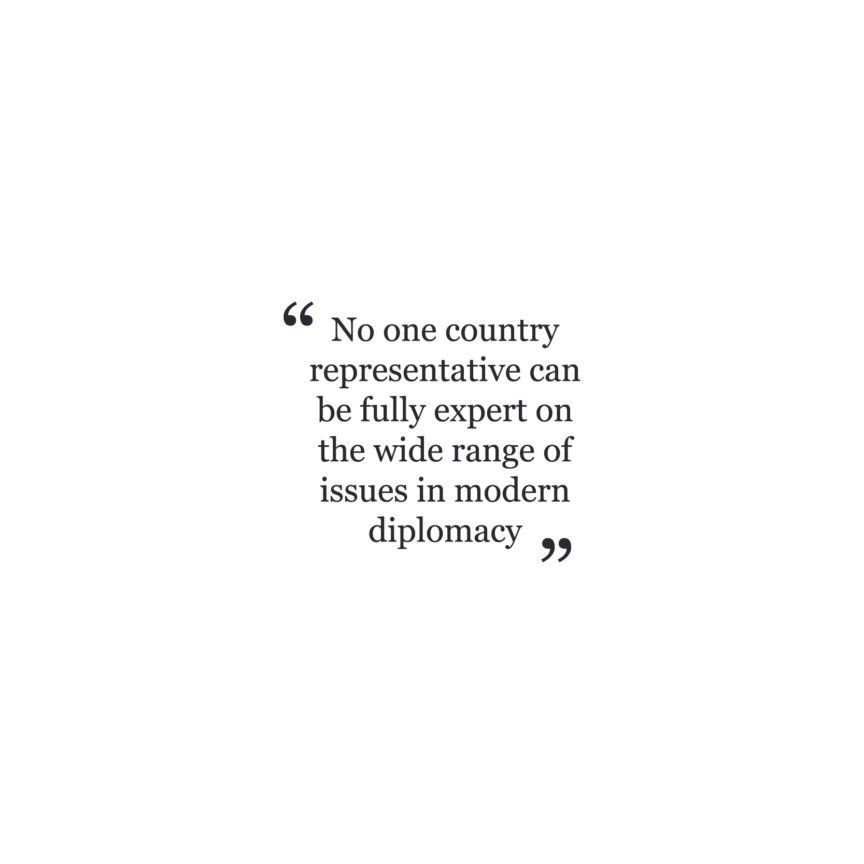
3. Drive closer joint working by international specialists and subject specialists
No one country representative can be fully expert on the wide range of issues in modern diplomacy.[4] But driving closer joint working by international specialists and subject specialists within government in a partnership model means that both types of specialists can bring their expertise to bear on complex matters in a manner that is aligned, is not hierarchical and can effectively deliver cross-government agreed outcomes.
Consider, for example, a food security expert invited from London to negotiate international agreements at the United Nations. He or she is likely to have deep expertise in food security, but is unlikely to know about the inner workings of the UN. Close working between the food security expert and a UN expert, a specialist diplomat at the UK mission to the UN brings together the skills and knowledge needed to get results in a manner that is greater than the sum of the parts.
Further examples might include climate experts working in international climate negotiations (e.g. UNFCCC); trade experts working in international trade negotiations (e.g. WTO rounds); human rights experts explaining their countries’ practices or pushing forward international law and standards at the UN Human Rights Council; health experts negotiating pandemic responses at the WHO; and law enforcement specialists negotiating bilateral cooperation agreements to tackle drug smuggling or international criminal activity.
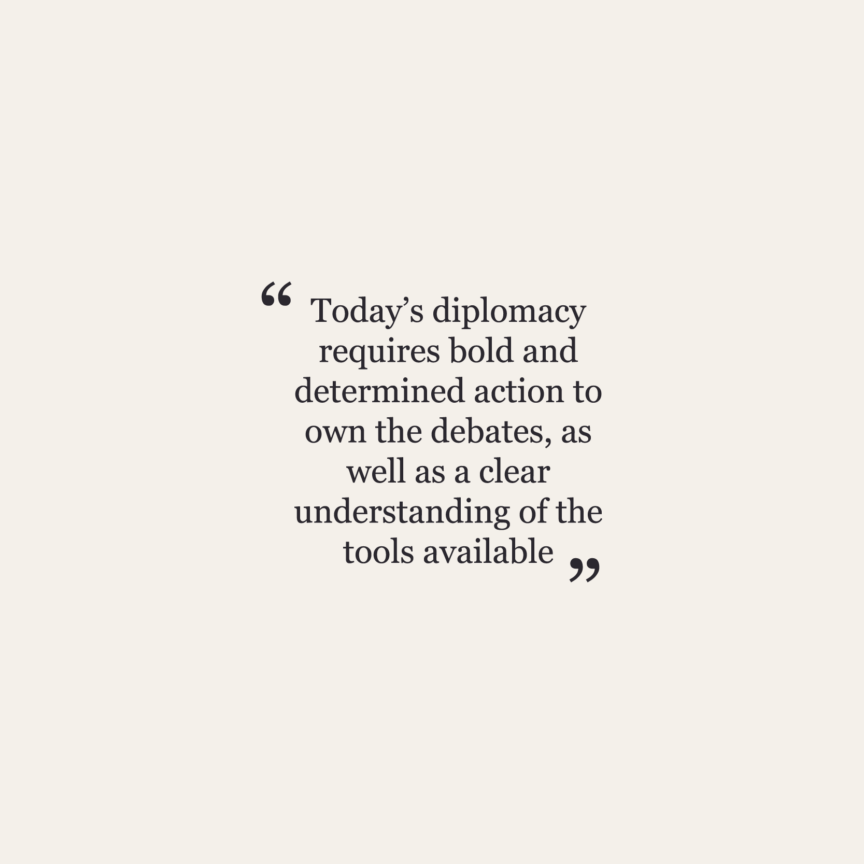
4. Use integrated engagement methods
Successful diplomacy is an active pursuit. Integrating engagement methods, from face-to-face diplomacy to online engagement, is crucial. Gone are the days of diplomacy featuring aristocrats sitting and talking around a green, felt-covered table. Today’s diplomacy requires bold and determined action to own the debates, as well as a clear understanding of the tools available.
By way of example, more than a year after Russia’s invasion of Ukraine, we see the Ukrainian president, Volodymyr Zelensky, still tirelessly working to galvanise international support for Ukraine. He makes use of engagement methods that range from the orthodox – for example, appeals at international forums such as the United Nations – to the immediate and dynamic, posting selfies on Twitter, dressed in in army fatigues, at battle sites and surrounded by soldiers. He has mastered the art of appealing to a wide variety of audiences through numerous, differentiated channels, always with a consistent message, “Support Ukraine”.
Zelensky has an impressive grasp of how to use the full range of diplomatic engagement to get what he wants. He starts with clear and specific objectives. His top outcome is to push Russian forces out of Ukraine. His supporting objectives include access to weapons and ammunition, sanctions to undermine Russia’s war effort, military training for his forces and economic assistance.
He knows who the final decision-makers are on these issues – generally heads of government, defence ministers and foreign ministers – so he targets them. But he also targets those who influence the decision-makers.
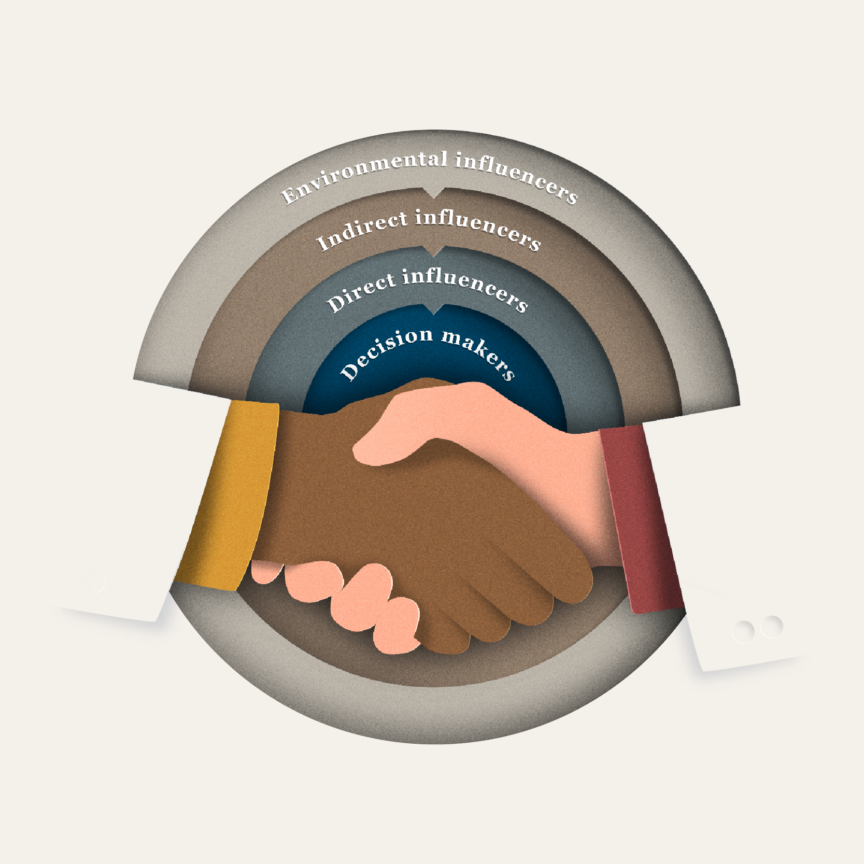
He identifies those who directly influence the decision-makers, such as junior ministers and senior officials, and he and his team are in close contact with them with detailed technical requirements.
And while Zelensky knows that lawmakers in most countries can’t directly make the decisions he needs, he addresses parliaments — because he knows MPs are indirect influencers of the actual decision-makers.
Beyond this, he targets the media, which is where his imagery, pithy phrases and evident personal integrity and bravery fit in. Zelensky works in a skilful and integrated way to create an environment in which it is easier for decision-makers to make the decisions he wants, and harder for them to make the decisions he doesn’t want. He comes across as human and relatable, when in fact he is deeply skilled at using limited resources to the maximum possible effect.
Zelensky displays a masterful understanding of the fact that most international decisions are taken by individuals, or small groups of individuals. Close targeting of the decision-makers – not forgetting the direct, indirect and environmental influencers – is the most effective, and most cost-effective, way to deliver international outcomes.
In contrast is the approach that Yanis Varoufakis – then finance minister – used in trying to build international support for his policies to manage Greece’s financial crisis. Varoufakis had clear objectives, but he was unable to deliver them. He focused heavily on the media environment and indirect influencers, and built some support there. But he failed to secure the support of direct influencers and to bring the real decision-makers on board, perhaps because he did not fully understand their motivations and the limitations of publicly applied leverage. The result is that he ended up with some public sympathy, but without the real international support he wanted.
The stakes for successful diplomacy are high. An increasingly globalised world, with a proliferation of communications channels, has brought with it a series of ever more complex challenges. Getting diplomacy wrong can result in ongoing harm. Getting it right – while more challenging than ever – is an opportunity for increased security, prosperity and positioning for a country and its citizens.

About the author
Jolyon Welsh leads Consulum’s Diplomatic Outcomes programmes, supporting governments to deliver outcomes from challenging international situations. Jolyon has more than thirty years’ experience, including as Acting High Commissioner to Australia, serving in Sri Lanka and at the United Nations headquarters in New York, and working in the Foreign Office in London as Head of Public Diplomacy and as Head of the Arabian Peninsula and Iran Department. He also ran the British government’s international digital engagement strategy. He has been a regular guest lecturer on public diplomacy theory at Oxford University, and in 1996 was made a Chevalier of the Légion d’honneur by President Chirac of France.
References
[1] World Bank (2020). COVID-19 to Plunge Global Economy into Worst Recession since World War II. Available at: https://www.worldbank.org/en/news/press-release/2020/06/08/covid-19-to-plunge-global-economy-into-worst-recession-since-world-war-ii
[2] “The Ruling Few: Or the Human Background to Diplomacy“, by David Kelly. Hollis & Carter, London. 1952.
[3] “Engagement: Public Diplomacy in a Globalised World”, by J Welsh and D Fearn (eds.). The Foreign and Commonwealth Office, London. 2008.
[4] Mulgan, G. (2023, draft). Whole of government innovation: Why and how to align the actions of multiple ministries and agencies around big goals such as net zero and use of AI. Available at: https://www.geoffmulgan.com/post/whole-of-government-innovation
